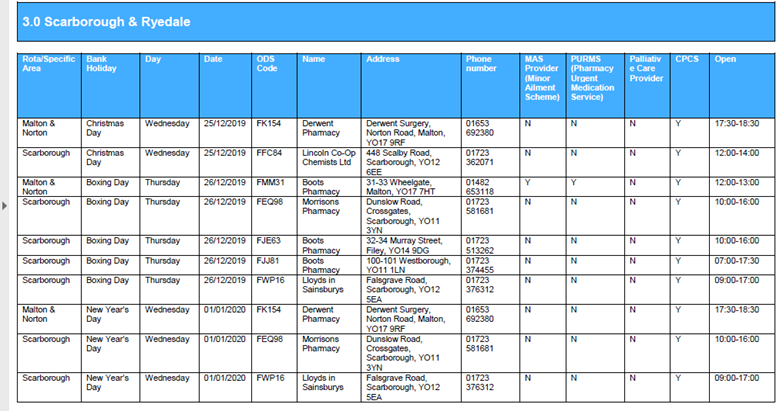Posts Tagged ‘NHS’
New community equipment ‘amnesty bin’
A new ‘amnesty bin’ to make it easier for people to return on loan community equipment like walking frames and crutches has been installed at a household waste recycling centre in Harrogate.
It follows talks between Medequip Assistive Technology Ltd – which issues community equipment to patients on behalf of North Yorkshire County Council and clinical commissioning groups in the county – and Yorwaste which manages the area’s household waste recycling centres.
In addition to the new amnesty bin at Harrogate’s Penny Pot Lane recycling centre and three amnesty bins at York Hospital and Friarage Hospital in Northallerton there are plans for a further depository at one of the household waste recycling centres in Scarborough.
Medequip’s North Yorkshire Operations Manager, Darren Clark, said: “It’s not as simple as knowing where the equipment is originally deployed – equipment may be lost, passed on to another family member or even put away in a loft.
“We realise we need to get the message across to people that it is important to return these items, but we also recognise that we have to make it easier for people to arrange collection or to return the equipment to an accessible location.”
Community equipment like walking frames, sticks, crutches and other daily living aids costs the NHS and local authorities millions of pounds every year. Unfortunately, a lot of this equipment never finds its way back to the issuing authority, where it can be cleaned and safely reused.
A Return, Reuse, Recycle campaign originally instigated by Medequip in partnership with West Suffolk NHS back in 2017 has been taken up by North Yorkshire County Council and clinical commissioning groups in York and North Yorkshire. The county council and local NHS are hoping to see recycling rates increase significantly as a result of this initiative.
Dr Charles Parker, the clinical chair elect for North Yorkshire Clinical Commissioning Group (CCG) said: “Increasing the number of places where people can deposit unwanted equipment like crutches and walking frames is a huge positive.
“Much of the equipment that’s returned is in a good condition and can be cleaned, serviced then reissued to someone else in need. The objective is to continue to deliver cost-effective, efficient and safe community equipment solutions which help the NHS budget go further.”
Cllr Michael Harrison, North Yorkshire County Council’s Executive Member for Health and Adult Services, said: “The county council, in conjunction with our CCG partners, are always looking for opportunities to encourage and enable people who have been issued with equipment to be able to return this for recycling, repair or disposal.
“As such we have been keen to promote the ‘Return Recycle Reuse’ campaign in conjunction with CCG colleagues and our integrated equipment provider, Medequip, and prevent equipment being discarded or left unused.”
All equipment delivered by Medequip on behalf of North Yorkshire County Council and clinical commissioning groups in York and North Yorkshire is accompanied by a leaflet with full details on how to return the items once they are no longer required, and every item carries a barcode label which also features a collection telephone number and a unique identifying code.
In addition to the amnesty bins, equipment can be returned to Medequip’s drop off points at Dunslow Court in Eastfield, near Scarborough and Manse Lane in Knaresborough.
Alternatively, Medequip will pick up some loan items for free – call 01423 226240 or email north.yorks@medequip-uk.com
Read MoreScarborough and Ryedale Pharmacy opening hours – Christmas and New Year
North Yorkshire Clinical Commissioning Groups back World Antibiotics Awareness Week campaign
NHS Hambleton Richmondshire and Whitby, NHS Harrogate and Rural District and NHS Scarborough and Ryedale Clinical Commissioning Groups (CCGs) are backing a national campaign which aims to increase awareness of antibiotic resistance.
The campaign known as ‘World Antibiotics Awareness Week’ will run from 18 to 22 November targeting the general public, health workers and policy makers to improve awareness and understanding of antibiotic resistance through effective communications, education and training.
Speaking on behalf of the three clinical commissioning groups in North Yorkshire, Dr Tim Rider, GP Prescribing Lead, said: “Taking antibiotics inappropriately encourages harmful bacteria that live inside you to become resistant. That means that antibiotics may not work when you really need them. This puts you and your family at risk of a more severe or longer illness.
“If you or a family member has a cold or flu, antibiotics probably aren’t the answer, ask your pharmacist to recommend medicines to help with the symptoms or pain, they are experts in minor illnesses.
“Antibiotics are needed for serious bacterial infections such as sepsis, pneumonia, urinary tract infections, meningococcal meningitis and sexually transmitted diseases. If you are worried you may have something more serious than a cold or flu, speak to your doctor who will be able to advise you on the best treatment option.”
With no new antibiotics developed in the last 30 years patients are encouraged only to take them if they need to. Taking them unnecessarily could make them less effective when fighting serious infections.
Without the effectiveness of antibiotics, routine operations like hip replacements, organ transplants and caesarean sections or chemotherapy treatments will become increasingly dangerous or impossible.
Patients can support the campaign by becoming an ‘Antibiotic Guardian’ at: https://antibioticguardian.com/
More information on the campaign can be found on the World Health Organisation website: https://www.who.int/campaigns/world-antibiotic-awareness-week
Read MoreNew programme launched to prevent abusive head trauma injuries to babies
The ICON programme has been initially funded by the four North Yorkshire Clinical Commissioning Groups (CCGs) and delivers four simple messages before the birth and in the first few months of a baby’s life which will be communicated by Midwifery and Health Visitor services :
I – Infant crying is normal;
C –Comforting methods can help;
O – It’s OK to walk away;
N – Never, ever shake a baby.
These ICON messages have been demonstrated to help parents and carers manage the stresses which can be caused by normal infant crying. Midwives, Health Visitors and other professionals across the region have developed ICON expertise to help give parents and carers the tools they need to help keep their babies safe. They have also produced an information graphic around infant crying which can be found here.
Health and social care recruitment event planned at Coventry Univeristy (CU) Scarborough
Humber, Coast and Vale’s Excellence Centre is hosting a recruitment event aimed at people with aspirations of working in health and social care.
The event will be held at CU Scarborough on Thursday 7 November between 2pm and 6pm.
Attendees will be given the opportunity to find out more about the wide range of jobs and careers that are available in Scarborough and Ryedale and across the wider Humber, Coast and Vale region.
Local health and social care employers will be attending the event – supported by NHS Scarborough and Ryedale Clinical Commissioning Group (CCG) – to provide information on current vacancies and training programmes within their organisations.
Margaret Wilson, Project Manager at Humber Coast and Vale Excellence Centre, said: “I think this is a brilliant opportunity for people who want to work in health and social care but don’t know where to start.
“It is a chance to learn about the broad range of job opportunities across Humber, Coast and Vale including mental health services, learning disability services, community services, healthy lifestyle and addiction services as well as a number of apprenticeship opportunities.
“There are lots of different jobs in health and social care so there is sure to be something for everyone whether you want to work in a hospital or residential home or in the community.”
Working in health and social care, you could be supporting someone with a physical or learning disability, someone with a mental health condition or someone who is frail or elderly.
The event is open to everyone, whatever your level of experience. Visit: https://www.eventbrite.co.uk/e/could-you-care-health-and-social-care-recruitment-event-tickets-76421598057 to book your place.
Read More

